Hijab rules in Dubai
The Hijab rules in Dubai, as an important cultural and social issue in the city, are a blend of Islamic principles and the demands of modernity, which has always been a subject of attention. Dubai, one of the seven emirates of the UAE, with its diverse population consisting of various nationalities and cultures, strives to maintain a balance between religious traditions and social needs.
While hijab is a legal requirement in many Muslim countries, the Hijab rules in Dubai are more relaxed compared to other parts of the Emirates and are considered more as a cultural and religious guideline. However, wearing the hijab in public spaces, especially in religious and formal settings, holds particular significance for Muslim women, and these laws may become stricter under certain circumstances.
This unique situation in Dubai has raised questions among tourists and non-Muslim residents about the boundaries of individual freedom, respect for local culture, and conformity to social norms. Therefore, Hijab rules in Dubai are not only a religious matter but also an integral part of the city’s social and cultural identity. In this text, we will take a closer look at these laws and how they impact daily life and social behavior in Dubai.
This article will examine the Hijab rules in Dubai, which is one of the important and controversial topics in the society of the United Arab Emirates.
Diyar Rent, a reliable choice for car rentals in Dubai, offers a variety of modern and high-quality vehicles to meet your different needs, providing a comfortable and hassle-free travel experience.
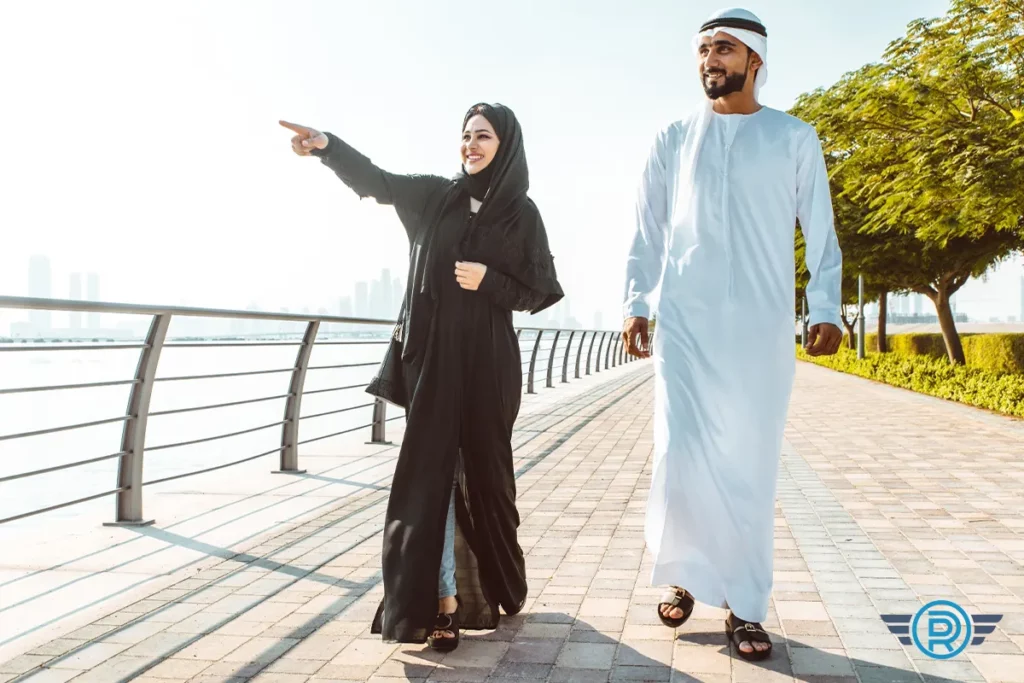
Is hijab mandatory in the UAE?
In response to the question of whether wearing a hijab is mandatory in the UAE, the answer is no — Islamic hijab is not mandatory for women in Dubai or other emirates. As one of the most international and tourist-friendly cities in the Middle East, Dubai has relatively flexible dress code regulations, especially for tourists and non-Muslims. However, dressing modestly in public remains important due to the cultural and religious values of Emirati society.
According to hijab laws in Dubai, women are not required to wear a chador or headscarf in public places, but they should avoid wearing very short, revealing, or inappropriate clothing. Outfits should be respectful, modest, and suitable for public settings. In places like mosques, religious centers, or official institutions, women must wear Islamic attire, including full body coverage and a headscarf. These rules are established to maintain the spiritual and religious atmosphere of such places.
Similar dress guidelines apply to men. They are also expected to avoid wearing very short or inappropriate clothing in public. Wearing very short shorts, tank tops, or unconventional outfits can be seen as inappropriate in some areas and may even result in a warning from law enforcement.
Although hijab is not mandatory in the UAE, observing dress codes is a sign of respect for the local culture and laws. Following these guidelines helps tourists enjoy their stay peacefully and avoid legal issues.
General hijab rules for women and men in Dubai
In Dubai, the laws regarding hijab for women and men are more moderate compared to many other Islamic countries; however, observing local customs and culture remains essential. Wearing Islamic attire such as a headscarf or chador is not mandatory for women, except in religious places like mosques, where covering the hair and wearing long and modest clothing is required.
In other public spaces such as shopping centers or streets, clothing should be appropriate and respectful, meaning that wearing revealing, very short, or tight clothing should be avoided. Swimwear is allowed at designated beaches and swimming pools, but once outside these areas, suitable clothing must be worn.
Men are also required to dress respectfully. Wearing overly revealing clothes such as tank tops or very short shorts in public places is inappropriate and may receive negative reactions from the local community or even warnings from the police. When entering mosques, men must also wear clean and modest clothing such as long pants and sleeved shirts.
Overall, the purpose of these restrictions is to maintain cultural order and respect for the Islamic values upheld in the UAE. Following these guidelines not only helps avoid potential issues but also demonstrates respect for the host country’s laws.

Hijab rules in different areas of Dubai
Dubai is a city with great cultural diversity, hosting numerous tourists and residents from various countries around the world. However, due to its location in an Islamic country, observing certain dress code principles remains important in different areas of the city. Hijab regulations in Dubai are generally not strict, but the level of adherence may vary depending on the area.
Dubai’s dress code in public places
Dubai, as one of the most modern and international cities in the Middle East, hosts millions of tourists from around the world. Despite its open and global atmosphere, certain cultural and social principles rooted in Islam are still observed in public spaces. Hijab rules in Dubai are part of these principles, primarily aimed at maintaining mutual respect between cultures and honoring the traditional values of the UAE.
In public areas such as shopping malls, streets, restaurants, parks, and metro stations, clothing should be respectful and appropriate for social settings. Women are not required to wear Islamic hijab such as a headscarf or chador, but they should avoid wearing very short, tight, revealing, or inappropriately cut clothing. Open-back tops, short shorts, or see-through garments in public can attract unwanted attention or even result in a warning from security personnel.
There are also dress code expectations for men. They should avoid wearing tank tops, very short shorts, or overly casual clothing in public places. Suitable attire includes long trousers and a basic shirt or modest T-shirt. In certain locations like luxury hotels or formal restaurants, wearing semi-formal or formal attire may be required.

Dubai women’s clothing rules in markets
In Dubai, dress code rules for women in markets, especially in traditional markets like the Gold Souk and Meena Bazaar, primarily depend on respecting Islamic and local culture. These markets, known as traditional and busy shopping hubs in Dubai, require adherence to dress codes that align with Islamic cultural norms.
While hijab is not mandatory in Dubai for women, in more traditional markets, it is advised to dress in a manner that reflects the local cultural values. Women should avoid wearing very short, tight, or revealing clothing and instead opt for longer and more modest outfits. The use of a headscarf or Islamic hijab is recommended for Muslim women, but it is not required for non-Muslim tourists. Generally, wearing long-sleeved clothes, long trousers, or long skirts is common attire in these markets.
Although the hijab rules in these areas are not as strict as in some other public places, like mosques or religious sites, it is important to pay attention to appropriate clothing while shopping in these markets. This is especially important for foreign tourists who may not be familiar with local culture, as they should avoid wearing outfits that could attract unwanted attention or make the local people uncomfortable.
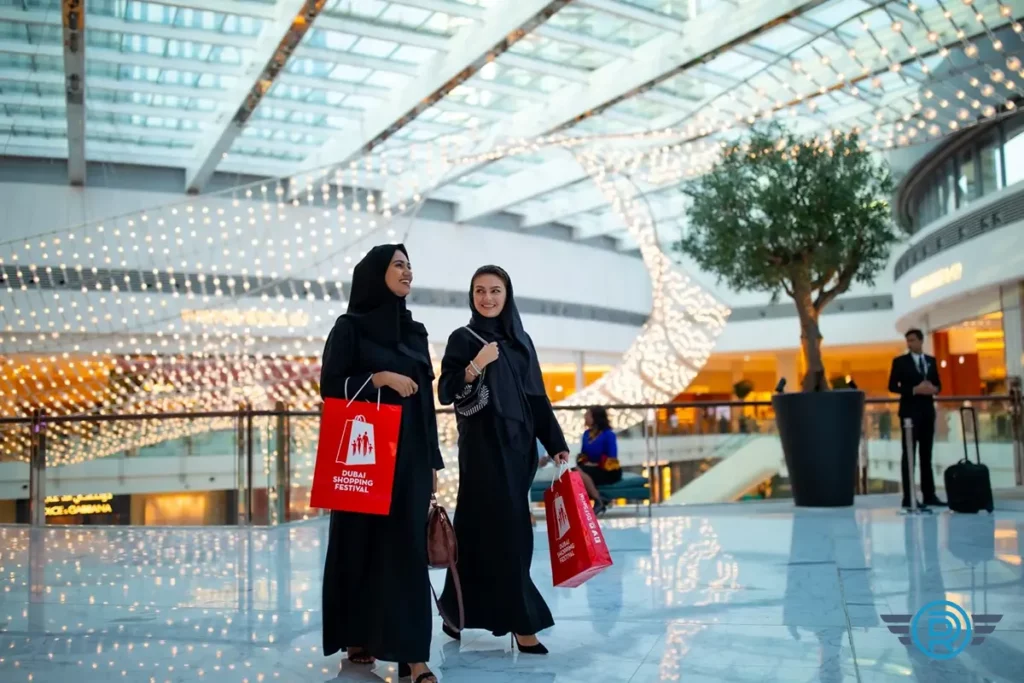
Clothing rules in religious places and mosques
In Dubai, an Islamic city, hijab rules in religious places, especially in mosques, are more important and stricter than in other public spaces. These regulations are in place to maintain the sanctity and respect of religious sites and the Islamic values upheld by the UAE society. In these places, adhering to appropriate dress codes is mandatory for visitors, including tourists and non-Muslims.
For women, wearing Islamic hijab in mosques and religious sites in Dubai is compulsory. This means covering the hair completely with a headscarf or chador and wearing long, modest clothing. Short, tight, or revealing clothing is not acceptable in these locations. Often, at the entrance of mosques, headscarves and abayas are provided for women to use if necessary. Additionally, women are required to remove their shoes before entering the mosque and leave them outside.
For men, similar rules apply. They should avoid wearing inappropriate clothing, such as tank tops or very short shorts, in mosques and instead wear more formal and covered attire. Men must wear long trousers and a long-sleeved shirt. In some mosques, men may also be asked to cover their hair, though this rule is less commonly enforced.
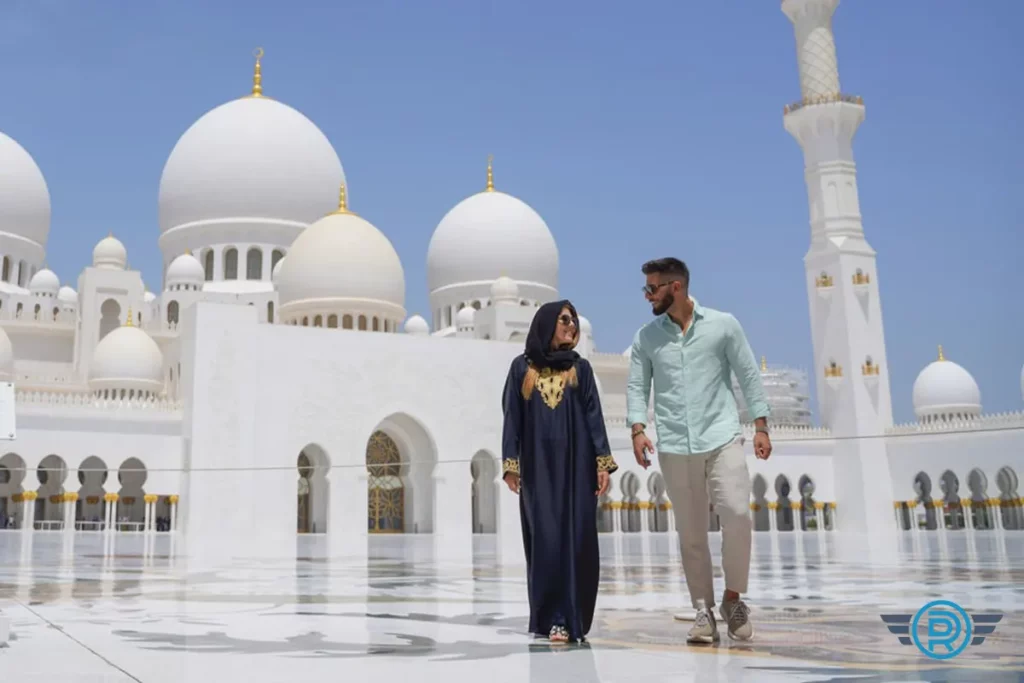
Cover-up rules on Dubai beaches
In Dubai, known as one of the world’s most popular tourist destinations, dress code rules on beaches are relatively more relaxed compared to other public places. However, respect for certain cultural norms and local customs is still important. On Dubai’s beaches, wearing swimwear is allowed for both women and men, but maintaining Islamic hijab and proper clothing in other public areas remains mandatory.
1. For women
On Dubai’s beaches, women are allowed to wear swimwear such as bikinis or swimsuits. These outfits are only permitted within the boundaries of the beaches and private swimming pools. However, once leaving these areas, covering the body with appropriate clothing is necessary. For example, wearing short or very revealing clothes in the streets or other public spaces in Dubai may attract attention and be considered inappropriate.
Muslim women or those who wish to adhere to Islamic hijab can wear swimwear with hijab. These swimsuits are specifically designed to cover the body completely while being comfortable for swimming. Some hotels and private pools may also request women to wear such swimsuits.
2. For men
Men, like women, can wear swimwear such as swimming trunks or shorts at the beaches. These outfits are limited to beaches and public swimming pools, and wearing excessively short pants or casual clothes in other public areas, such as shopping centers or streets, is not appropriate.
Important Notes
- After leaving the beaches and swimming pools, both women and men must wear more covered clothing. In some private beaches and pools, cleanliness and adherence to more specific dress code rules may be enforced.
- Hijab rules in Dubai beaches are more relaxed compared to other public places, but it is still essential for tourists and residents to respect the local culture and customs, ensuring they maintain appropriate clothing outside recreational areas.
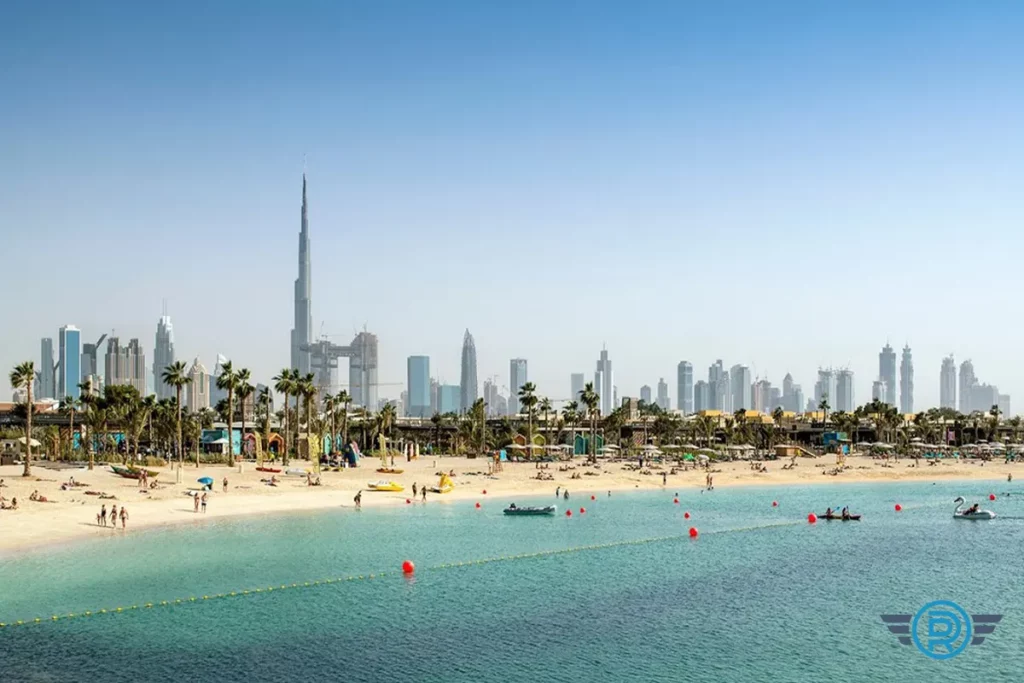
Women’s clothing in restaurants and clubs
Hijab rules in Dubai restaurants and clubs are relatively flexible, especially in commercial and tourist areas. Generally, dress codes in these places are based on social standards and the formal expectations of appropriate attire for such environments.
- Restaurants
In Dubai’s restaurants, particularly in international restaurants, hotels, and large shopping centers, the dress code is more relaxed. Women can wear formal or semi-formal clothing such as long dresses, skirts, or chic trousers. Islamic hijab is not mandatory for women in restaurants, but attire should still be respectful and appropriate. Non-Muslim women are not required to wear the hijab and can wear more modern or open clothing. However, wearing overly revealing or very short clothes may cause discomfort in the environment.
In some luxury or more formal restaurants, due to the specific ambiance, women may be asked to wear more elegant clothing. In general, clothing that covers the shoulders or the upper body is more accepted.
- Clubs
In Dubai’s clubs and nightlife venues, dress codes are more related to trendy fashion standards. Women can wear evening dresses, short dresses, chic skirts, or even jewelry-adorned outfits and high heels. Wearing Islamic hijab is not required in clubs, and women can dress according to their personal style, choosing modern and fancy clothes. However, it’s important to note that overly simple or everyday attire may not be suitable for these environments.
Additionally, in some specific clubs and restaurants in Dubai, internal rules may require wearing formal or semi-formal attire, especially for women who wish to enter VIP areas or exclusive lounges.
- Important Notes
It is essential to maintain a respectful dress code in both restaurants and clubs. While hijab is not mandatory in these spaces, wearing clothes that are overly revealing or inappropriate may draw attention from others or staff. In traditional restaurants or specific clubs with a religious atmosphere, a more conservative dress code may be requested.
Women’s hijab in rural areas of Dubai
Dress code rules for women, especially in rural areas, may differ slightly from those in urban areas. While in most urban regions, including Dubai Mall or Jumeirah, the dress code is more relaxed and flexible, in rural and more traditional areas, these rules can be stricter.
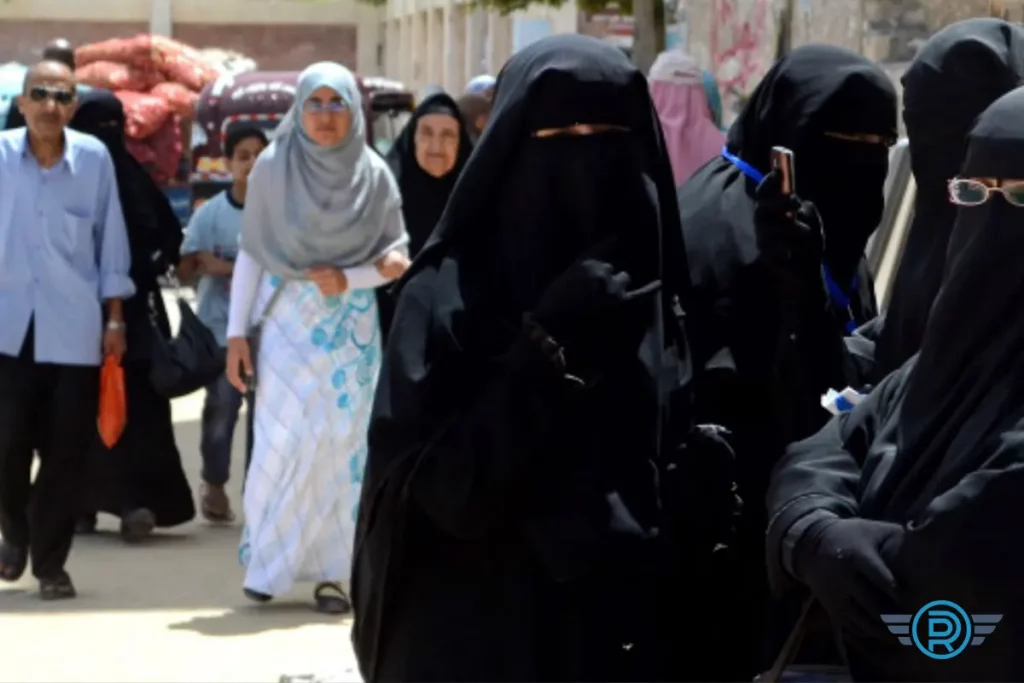
In rural areas of Dubai, which are less influenced by global and tourist cultures, Islamic hijab is generally more observed for Muslim women. In these areas, local women typically adhere to traditional clothing, such as the abaya (chador) and headscarf (hijab), preferring more modest attire. These coverings are especially common in public places and when walking in the streets or open spaces.
Although Hijab rules in Dubai are not officially mandatory in most urban areas, in rural regions, it is more informally expected to observe Islamic hijab. Additionally, women who live in or are visiting these areas should respect the local culture and choose their clothing in accordance with the customs and traditions of the community.
Important points about women's clothing in Dubai
According to these rules, you can wear comfortable clothes, but your knees and arms should be covered. Other key points include:
- Hijab restrictions for tourists are less strict.
- Children can wear any kind of clothing, but they should not be naked.
- Avoid wearing clothes with offensive or racist slogans.
- In traditional markets in Dubai, where most locals reside, it’s better to pay more attention to adhering to the hijab.
- In recreational areas and beaches across Dubai, you can wear various types of swimwear. Dubai has specific dress codes for each area.
final word
In Dubai, the hijab rules for women are flexible. Islamic hijab is not mandatory, and women can choose modern and more relaxed clothing in tourist and commercial areas. However, in mosques and religious places, wearing the Islamic hijab is required. In rural and more traditional areas, more conservative attire is expected. On beaches and in pools, swimwear is allowed, but once leaving these areas, appropriate clothing is necessary. In restaurants and clubs, the attire should be stylish and suitable for the environment. Overall, respecting the local culture and traditions of Dubai when choosing clothing is very important.




































 Rolls Royce
Rolls Royce Lexus
Lexus Lamborghini
Lamborghini Porsche
Porsche Ferrari
Ferrari Toyota
Toyota Mercedes Benz
Mercedes Benz BMW
BMW Land Rover
Land Rover Bentley
Bentley Nissan
Nissan Cadillac
Cadillac Audi
Audi Chevrolet
Chevrolet GMC
GMC Hyundai
Hyundai Kia
Kia Mazda
Mazda